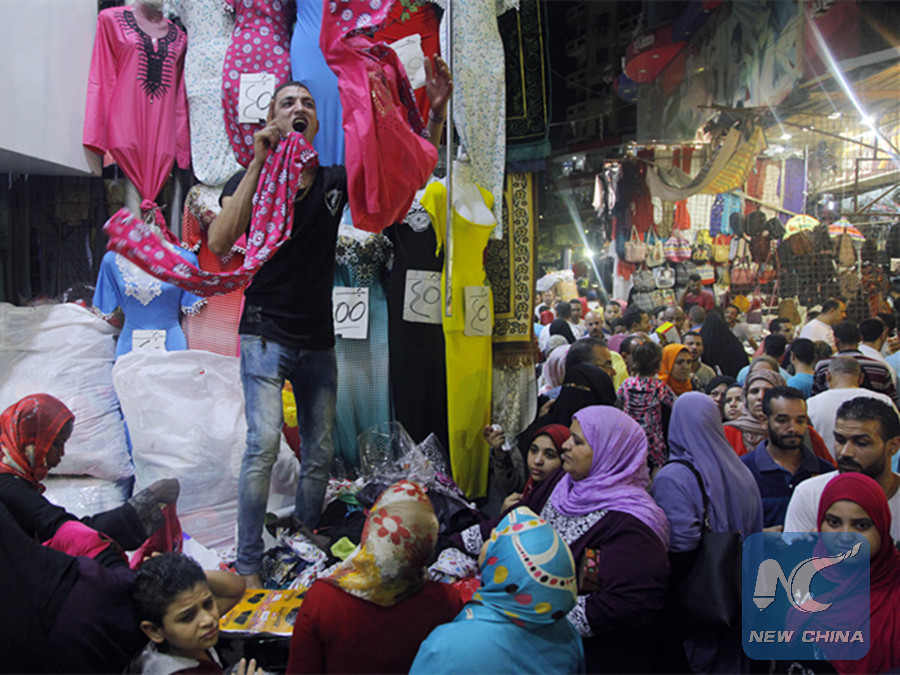
A seller sells clothes in a shop in Cairo, Egypt, on June 12, 2018. (Xinhua/Ahmed Gomaa)
CAIRO, June 14 (Xinhua) -- Cairo markets have been busy with shoppers as Muslim Egyptians are preparing for the Eid al-Fitr feast, the Islamic holiday that follows the fasting month of Ramadan.
Ahead of the three-day holiday, Egyptians usually flock to markets to buy new clothes, candies, pancakes and desserts to celebrate the feast.
The feast is a great chance for sellers, mainly clothes traders, who seize the season to sell out their accumulated goods. However, both sellers and shoppers complain this year of high commodities prices that led to a notable business decline.
"I can assure that this season is the worst for me," Mohammed Ismail, an owner of clothes shop at Mosky market, told Xinhua.
The man complained of a low customers turnout, pointing out that he had less than half of the businesses last year.
"The situation is not good... people do not have enough money to buy new clothes, they can barely manage to feed their kids," he added.
Ismail, who imports the majority of his goods from China, said he did not order many commodities ahead of the feast for fear of being unable to sell them during the season.
The middle-aged man hoped that the economic situation in Egypt would improve soon under the government's reform plan, which he believes would boost the country's economy.
Over the past few years, Egypt has been struggling to overcome an economic recession that resulting from political turmoil and relevant security challenges, which led the country in late 2016 to start a strict three-year economic reform program.
The program includes austerity measures, energy subsidy cuts and tax increases, in addition to local currency floatation to contain U.S. dollar shortage.
Despite causing price hikes and high inflation rates, the liberalization of the Egyptian pound's exchange rate encouraged the International Monetary Fund (IMF) to support Egypt's reform plan by providing a 12-billion-U.S. dollar loan, half of which has already been delivered to the North African country.
In its annual report released in May, the IMF expected Egypt's economic growth rate to reach 5.2 percent in the 2017-18 fiscal year (FY) and further accelerate to hit 5.5 percent in the 2018-19 FY, compared with 4.2 percent last year.
Not far away from Ismail's store, a handful of women gathered around Mohammed Yahiya, a hawker selling women's casual wears.
"It is better to sell more at a lower price, than selling less at a higher price," the 24-year-old father of two told Xinhua as more customers approached him.
Yahiya said his strategy has proved successful as it helped him sell most of the Chinese-made goods he recently bought from a Cairo wholesale merchant.
"I was scared I would not be able to sell the goods due to the declining purchases in the market," Yahiya added. "Earning less is better than earning nothing at all."
Although the young man sold at discounted prices, 60-year-old widow Um Hany Hassan still believes the prices are unaffordable.
Hassan, who works as a vegetable seller in the market, said she still has to support her two married sons as they have been unemployed for several months.
"I want to buy new clothes for my grandchildren, but the prices have skyrocketing," the lady said as she looked for cheaper clothes in the overcrowded market.
"I planned to buy two shirts for each, but now everyone will only get one," Hassan added, flashing an ironic smile.

